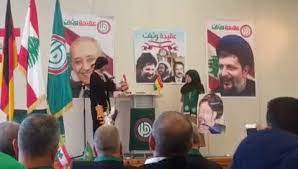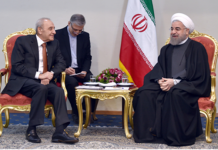الشيّاح ـ برلين ـ الشيّاح
حازم صاغية/الشرق الأوسط/11 أيار/2022
Chiyah- Berlin- Chiyah
Hazem Saghieh/Asharq Al Awsat/May 11/2022
Presenting the leader as a demi-god is among the features of Lebanese cronyism. Those who present him this way are followers drawn to him by kinship loyalties, primarily sectarian, which are reinforced with services that take an array of forms, the most prominent of which is the provision of employment opportunities in the public sector. The more public money is stolen, then, the bigger the politician becomes.
Parliament Speaker Nabih Berri is not the only one who has enjoyed and continues to enjoy the image of an infallible leader. The other so-called “gravitational poles” of Lebanese political life, who head blocs in their sects and regions, share this same image.
Nevertheless, Mr. Berri may have had more glorifying chants dedicated to him than any of the others, and praise of man has gone so far that any believer could see it as explicit blasphemy. For example, among the slogans and phrases on posters glorifying him, one reads: “If it were not for the h (in Nabih), you would have been a prophet (Nabi in Arabic).” Another announces your arms “purify” (in the religious sense). A third cries out for help: “Oh, what will become of us after you’re gone;” a fourth is surprised: “By God, where did you come from?” A fifth threatens: “All of you are doomed if he loses his patience.”
Recently, with the Lebanese diaspora voting in the general elections from the countries where they reside, Lebanese followers of Berri exported this “culture” to Germany, chanting:
“Oh, Nabih rest assured (irtah)
Berlin’s turned into Chiyah”
Chiyah is a Shiite part of the southern suburbs of Beirut that is adjacent to the Christian part known as Ain al-Rummaneh. The Two Years War (1975-1976) was sparked by clashes between the two areas, leaving them both destroyed. Some of the traces of the devastation wreaked at the time continue to attest to it. At the time, the leftist youths showed unique enthusiasm for war in Chiyah, and a communist tenor sang that he would plant “a million daisies” in that area. These people looked and did not see, or that they saw the sectarian clashes between the two neighborhoods as a struggle waged by “toilers” from both sides (who were killing each other) against their both sides’ capitalists. And so, full of confidence in the future, they chanted:
“The red flag is flying high!”
Over Ain Al-Rummaneh and Chiyah.”
Of course, as in every other area in the country, only the flags of sectarian parties were waved, some green and some yellow, and all black. Amal Movement flags were Chiyah’s fate. Then came the flags of Hezbollah, who fought one of the Lebanese civil war’s most vicious wars against Amal in the second half of the eighties. Chiyah was among the theaters of their war. Chiyah certainly got its share of the destruction and killing wreaked by the Israelis in the 2006 war. As for the present, it is among the spots in the capital’s suburbs that are described as steadfast and more than capable of standing up to a long list of enemies.
In any case, Amal youths insisted on turning Chiyah into a model for Berlin. Wasn’t the German capital itself, during the Second World War, destroyed and impoverished to an immeasurably greater degree than Chiyah?
However, Germany broke with violence three-quarters of a century ago. Its democracy has consolidated, and its economy has become the strongest in Europe. Moreover, its two halves were then united three decades ago. With that, the Lebanese youths insisted on preaching the need to embrace the Chiyah model. That inclination could perhaps be seen as natural, similar to that of a merchant promoting his products. Syrian youths did something of this sort after they fled Assadist hell in droves and found refuge in Germany. Many jokes, inspired by their country’s political culture under Assad, emerged about how to deal with German Chancellor Angela Merkel: Merkel would rule “forever” and hand power down to her son like Hafez had handed it down to his.
Unlike their Syrian counterparts, though, the Lebanese youths were not joking. They seemed dead serious about exporting their model with Speaker Nabih Berri firmly on top. It would not be far-fetched to claim that they expressed, in their own way, a broad sentiment that has dominated Arab political culture for half a century. After Chiyah once aspired to become like Berlin, the latter must now aspire to become like Chiyah. This reversal of this course- which was set by Rifaa Rafi al-Tahtawi before being adopted by intellectuals, politicians, and educators who aspired to build their countries on the Western democratic model- was a gradual process, but its rise was steady.
In the meantime, political disputes with Western countries went from being political to cultural. Those intellectuals and politicians were slandered, and the West was depicted as a factory manufacturing only conspiracies, occupation, plunder, and aggression, while a key segment of contemporary culture was decried as a form of cultural invasion and misleading supremacist orientalism.
Who wants to follow in those footsteps? Who wants to follow in the footsteps of Berlin, whose war has ended and now despises wars in principle, while Chiyah remains on constant alter and awaits nothing but wars and bloodbaths of glory and heroism? Berlin should imitate the southern suburbs, not the other way around. Berlin should find itself a Nabih Berri type, or a Bashar al-Assad, to worship as Chiyah does.
We come to you with our idealized leader; Berlin, open your arms.
الشيّاح ـ برلين ـ الشيّاح
حازم صاغية/الشرق الأوسط/11 أيار/2022
من مواصفات نظام التزلّم اللبناني تصوير الزعيم كنصف إله. الذين يصوّرونه على هذا النحو هم أتباعه الذين يشدّهم إليه ولاء عصبيّ، طائفي في الغالب، معزّز بتنفيعات تتّخذ أشكالاً كثيرة أهمّها تأمين فرصة عمل في الإدارة. تكبر زعامة الزعيم، إذاً، كلّما زاد السطو على المال العامّ. رئيس المجلس نبيه برّي ليس الوحيد الذي حظي ويحظى بهذه الصورة المنزّهة. سائر من يسمّونهم «الأقطاب السياسيين»، ممن يتزعّمون كتلاً في طوائفهم ومناطقهم، يشاركونه إيّاها. مع هذا فبرّي قد يكون أكثر مَن حظي بعبارات تمجيديّة كهذه، والعبارات التي امتدحته ذهبت بعيداً جدّاً بحيث إن أي مؤمن قد يرى فيها كفراً صريحاً. مثلاً، من الشعارات والجُمل التي حملتها ملصقات التمجيد واحدة تقول: «لولا الهاء لكنتَ نبيّ»، وأخرى تعلن أنّ الطُّهر «يتوضّأ بين يديك»، وثالثة تستغيث: «يا ويلنا من بعدك»، ورابعة تندهش: «بالله عليك من أين أتيت؟»، وخامسة تهدّد وتتوعّد: «ويلكم إذا نفد صبره»…
مؤخّراً، مع إجراء الانتخابات العامّة في بلدان الاغتراب، صدّر لبنانيّون من أتباع برّي هذه «الثقافة» إلى ألمانيا. هكذا هتفوا:
«يا نبيه ارتاح ارتاح
برلين صارت شيّاح».
والشيّاح جزء شيعي من الضاحية الجنوبيّة في بيروت يحاذي الجزء المسيحي المعروف بعين الرمّانة. وكانت حرب السنتين (1975 – 1976) قد انطلقت من اشتباكات بين الشيّاح وعين الرمّانة، ما أنزل بهما تدميراً لا تزال بعض آثاره تشهد عليه. يومها تفرّد شبّان يساريّون بأن أخذتهم الحماسة للحرب في الشيّاح، وغنّى مطرب شيوعي أنّه سيزرع فيها «مليون أقحوانة». هؤلاء نظروا ولم يروا، أو أنّهم رأوا القتال الطائفي بين المنطقتين صراعاً يخوضه كادحوهما (الذين كانوا يقتل بعضهم البعض) ضدّ رأسمالييهما، فأنشدوا واثقين بالمستقبل:
«لاح العلم الأحمر لاح
بالرمّانه والشيّاح».
بالطبع، وكما في كلّ مكان آخر، لم تَلُحْ إلاّ أعلام أحزاب الطوائف، الخضراء منها والصفراء، ودائماً السوداء. الشيّاح كان نصيبها أعلام «حركة أمل» ومن بعدها «حزب الله» اللذين خاضا فيما بينهما إحدى أشرس الحروب اللبنانيّة في النصف الثاني من الثمانينات. الشيّاح كانت من مسارح تلك الحرب. وطبعاً ففي 2006 نالت الشيّاح حصتها من التدمير والقتل الإسرائيليين. أمّا الآن فهي بقعة من بقاع الضاحية الموصوفة بالصمود وردّ الصاع صاعين لقائمة طويلة من الأعداء.
على أي حال فشبّان «أمل» أصرّوا على جعل الشيّاح نموذجاً لمدينة برلين. أولم تتعرّض العاصمة الألمانيّة نفسها، بفعل الحرب العالميّة الثانية، إلى تدمير وإفقار أكبر بلا قياس مما تعرّضت لهما الشيّاح؟
لكنّ ألمانيا فارقت العنف قبل ثلاثة أرباع القرن، واستقرّت ديمقراطيّتها وصارت صاحبة الاقتصاد الأوروبي الأقوى، ثمّ توحّد شطراها قبل ثلث قرن. مع هذا أصرّ الشبّان اللبنانيون على هدايتها باعتناق نموذج الشيّاح. وهذا ميل ربّما كان طبيعيّاً يندرج في الخانة التي يندرج فيها ترويج المرء بضاعته. من هذا القبيل مثلاً أطلق شبّان سوريّون، مع انفجار موجة الفرار من الجحيم الأسدي واللجوء إلى ألمانيا، عدداً من النكات حول التعاطي مع المستشارة أنجيلا ميركل، مستمدّين نكاتهم من الثقافة السياسيّة في ظلّ الأسد. فميركل حاكمة «إلى الأبد»، وهي ستورّث نجلها حكم ألمانيا على غرار ما حصل عام 2000 في سوريّا.
الشبّان اللبنانيّون لم يمزحوا على غرار زملائهم السوريين. لقد بدوا جدّيين جدّاً في تصدير نموذجهم الذي يتربّع في صدارته الرئيس نبيه برّي. وليس من المبالغة أن يقال إن هؤلاء عبّروا بطريقتهم عن ميل عريض بدأ يستولي على الثقافة السياسيّة العربيّة منذ نصف قرن. فبعد أن كانت الشيّاح تطمح لأن تصير مثل برلين، صار على برلين أن تطمح لأن تصير مثل الشيّاح. وهذا إنّما كان انقلاباً متدرّجاً ومتصاعداً على الوجهة التي رأت النور مع رفاعة رافع الطهطاوي قبل أن يتعهدها مثقّفون وسياسيون وتربويّون فكّروا ببناء بلدانهم على مثال غربي وديمقراطيّ.
في هذه الغضون، انتقلت النزاعات السياسيّة مع بلدان الغرب إلى نزاعات ثقافيّة، وشُهّر بأولئك المثقّفين والسياسيين، وقُدّم الغرب بوصفه مصنعاً للمؤامرات والاحتلالات والنهب والعدوان، كما صُوّر جزء أساسي من الثقافة المعاصرة كغزو ثقافي واستشراق استعبادي ومضلّل.
مَن إذاً يريد أن يقلّد هؤلاء؟ من يريد أن يقلّد برلين التي توقّفت حربها وصارت تنظر إلى الحروب كشيء كريه، فيما الشيّاح صامدة على الدوام ومتأهّبة لا تنتظر إلاّ المعارك وملاحم المجد والبطولة. إنّ على برلين أن تقلّد الضاحية، لا العكس. إنّ على برلين أن تبحث عن نبيه برّي ما، أو بشّار أسد ما، تعبدهما كما تفعل الشيّاح. بالزعيم المعبود جئناك يا برلين. افتحي ذراعيك.






















